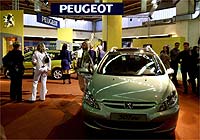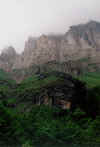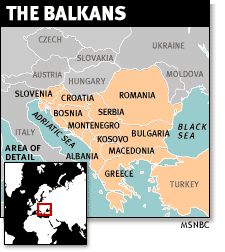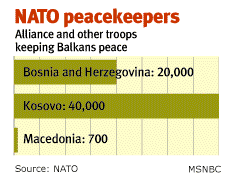|
Enter content here
CAR FAIRS "AUTOEXPO 2002" AND "TRANSPORT 2002" OPENED.
MIA

The 6th International Fair of Cars, Economy Vehicles, Car Industry and Equipment AUTOEXPO 2002 and the International Fair of Transport and Commercial Vehicles TRANSPORT 2002 were opened at the Skopje Fair Friday.
Macedonian Vice-Premier Zoran Krstevski opened the fair, emphasising the fact that the car industry in the world was greater by the day, with new types of cars, hoping that some of them would be presented at AUTOEXPO 2002.
Vice-Premier Zoran Krstevski stated that the possibilities for each citizen to by a new car might be better if banks and leasing-companies attended this fair.
"If the Government was in conflict with the vehicle importers in the course of last year, with the introduction of the Added Value Tax, this year's decrease of the custom taxes should positively influence on the interest of the car buyers", Krstevski said.
According to Krstevski, it is very significant for our businessmen that heavy vehicles are presented at the fair for the second time.
The fair, which will last until May 19, includes 174 participants from Macedonia, France, Germany, Italy, Ukraine, Slovenia, Turkey, Greece and Bulgaria, at an exhibition interior space of 10,000m2, and 5,000m2 of exterior exhibition space.
The 4 fair halls will contain the latest cars of the world famous producers, while the 3 fair annexes will include other products of the car industry. The exterior space will include transport and commercial vehicles.
The 6th International Car Fair will witness the presentation of the famous European car producers "Peugeot", "Citroen", "Volkswagen", "Audi", "Lada" and "Zastava", along with the latest cars of the Asian producers "Mitsubishi", "Mazda" and "Daihatsu".
International Fair TRANSPORT 2002 will present the giants-producers of transport and commercial vehicles: "MAN", "Volvo", "DAF", Iveco", "Mercedes", "Peugeot" and "TAM".
The fair will also include the presentation of the renowned tyre and oil producers "Dunlop", "Michelin", "Pirelli", "Hancock", "Sava", "Aral", "Texaco", "Fina" etc.
The general importer and distributor of "Skoda" for Macedonia "Primoauto" from Bitola will present itself at the fair, along with the presentation of the latest "Skoda Super".
The leader at the Macedonian car market "Euroimpex", which is the general importer of "Peugeot", will promote cars "Peugeot 206 Caravan" and "Peugeot 306 Caravan".
Companies "KIA Motors", "Bomak Intertrade" and "Makautostar" will also present themselves at the fair.
Meeting for Thwarting Illegal Wood Destruction in Tetovo Region.
Reality Macedonia - MIA

Leshnica, on Shar Mountain. Photo (c) 1998, by Tome Bogdanov. His high-quality photo gallery, contains numerous Macedonian mountain landscapes.
Tetovo, May 10 (MIA) - Meeting dedicated to the mass destruction of woods at Shar Mountain, Suva Gora and Zheden in Tetovo crisis region was held in Tetovo this afternoon.
Mayors of several municipalities, chairmen of local communities of several Tetovo villages, representatives of Macedonian Ecology Movement, public enterprise "Macedonian Woods"- branch office Leshnica, Ministry of Interior, Basic Public Prosecutor's Office, Forest Police, as well as representatives of the EU monitoring mission and NATO mission "Amber Fox" attended the meeting, which was organised by OSCE.
OSCE representative Walter Fleshir chaired the meeting, who emphasised that the goal of this meeting was to emphasise the huge consequences caused by the uncontrolled illegal woodcutting at Shar Mountain and other mountains in Tetovo crisis region.
It was underlined that zones of the most beautiful 6-decade beech, oak and mixed woods have been destroyed, as well as large damages to chestnut wood.
Most of the present pledged for thwarting of this activity, especially the representative of the Ecology Movement Antonio Jovanovski, who stressed the climate changes that occur as a consequence of illegal wood destruction, not only in Tetovo, but in the wider region.
"All international organisations will support the activities of the police and authority organs in Macedonia in thwarting these illegal activities," Walter Fleshir emphasised.
"This illegal and mass woodcutting is done by criminals that fill their pockets, while the local population feels the consequences," Fleshir added.
Deputy Public Prosecutor Zulkufli Rakipi also participated at the meeting, and talked about the legal consequences from the mass and illegal woodcutting.
"The communities will work on thwarting these illegal destruction of wood zones," part of Mayors of municipalities in Tetovo crisis region stated.
This is the first meeting of this kind after last year's military conflict in Tetovo crisis region.
BULGARIA - PAPAL VISIT - SCHEDULE.
BTA
Pope John Paul II to Celebrate Mass in Bulgarian in Plovdiv.
Sofia, May 10 (BTA) - Pope John Paul II, who will undertake an apostolic journey to Bulgaria from April 23 through 26, will celebrate Mass in Plovdiv (South Central Bulgaria) in Bulgarian, said the Catholic Bishops' Conference of Bulgaria.
The Holy Father will deliver his sermons and addresses to the Bulgarian people in Bulgarian.
The schedule of the papal visit was formally unveiled at a news conference Friday. The Pontiff will be welcomed at a ceremony in Sveti Alexander Nevsky Square in central Sofia on the evening of May 23. The official welcoming ceremony for the Sovereign of the State of Vatican City will be hosted by President Georgi Purvanov in front of the Tomb of the Unknown Soldier on the morning of May 24. Then the Pope will visit the St Alexander Nevsky Patriarchal Memorial Cathedral on the occasion of the Feast Day of Sts Cyril and Methodius and will lay wreaths at the saints' monument in front of the National Library. The Head of the Roman Catholic Church will pay a visit on Patriarch Maksim of Bulgaria at the Holy Synod Headquarters, and will meet with representatives of the Jewish community and with distinguished scientists and artists at the National Palace of Culture.
On May 25, the Holy Father will visit the Rila Monastery (Southwestern Bulgaria), where he will have a private meeting with Prime Minister Simeon Saxe-Coburg-Gotha. After that he will meet with Chief Mufti Selim Mehmed and representatives of the Muslim community and with dignitaries of the Evangelical churches, and will visit the two Catholic cathedrals in Sofia: the St Joseph's Concathedral (Western Rite) and the Exarchal Cathedral of the Assumption (Byzantine Rite).
The Holy Father is expected to consecrate the foundation stone of a new St Joseph's Church which will be built on the site of a church that was destroyed in the Allied air raids on Sofia in 1944, said Father Blagovest Vangelov, General Vicar of the Assumption Church.
On May 26 Pope John Paul II will celebrate an open-air Mass in Plovdiv's central square, at which he will beatify Kamen Vichev, Pavel Djidjov and Yosafat Shishkov, the three Catholic priests who were executed by firing squad on November 12, 1952 together with the Blessed Bishop Evgenii Bossilkov. Nearly 40 bishops and 100 priests have declared willingness to concelebrate the pontifical Mass which will be attended by some 30,000 of Bulgaria's 100,000 Catholics.
After Mass, the Pope will have lunch with the Catholic bishops of Bulgaria and is scheduled to meet with young Catholics in the afternoon. On the same day the Holy Father will leave the country.
Asked whether the Catholic Church is upset by the Holy Synod's reaction to the papal visit, Father Stefan Manolov of Plovdiv said this was a natural reaction of the spiritual leaders of the traditional religious denomination in every country, which is why negotiations are held before each ponitifical visit. In these negotiations, it is emphasized that the apostolic journey will not stir a commotion among believers. The Catholic Church representatives stressed that Pope John Paul II visits the countries where there are Catholics but his visits so far have never been followed by a mass conversion of Eastern Orthodox Christians into Catholics.
The Pope will be accompanied by his retinue, about a dozen cardinals, some six personal security guards, and about 60-70 official guests. In Sofia, he will put up at the Apostolic Nunciature, and the officials will be accommodated at the SAS Radisson and Hilton Sofia hotels. A large number of French and Italian priests, leading groups of pilgrims, are expected to arrive in Bulgaria.
The Latin (Western)-Rite Dioceses of Sofia and Plovdiv and of Nikopol and Rousse will present the Holy Father with rose oil and a carpet featuring the Chiprovtsi Virgin, respectively, and the Bulgarian (Byzantine)-Rite Catholic Exarchate of Sofia will offer the distinguished guest an icon of Jesus Christ.
Pope John Paul II will travel around Bulgaria by helicopter or car, and will use his personal Popemobil for short-distance movements.
At each meeting, the Holy Father will be sitting in a special chair, with the most
beautiful such chair being reserved for the celebration of Mass.
In connection with the papal visit, the Catholic Bishops' Conference of Bulgaria is staging an exhibition of documents and photos illustrating the spread of Catholicism in the Bulgarian lands. The exhibition will open at the National Library on May 16.
NATO Approves Changes To KFOR And SFOR.
NATO Press & Media

10 May/mai 2002
Communique
PR/CP (2002) 064
NATO is adapting its military presence in the Balkans to reflect the improving security environment in the region. NATO's North Atlantic Council, after full consultation with the Stabilisation Force (SFOR) and Kosovo Force (KFOR) contributing nations, today approved a series of changes to the NATO-led SFOR and KFOR missions in Bosnia-Herzegovina and Kosovo which will introduce a more regional approach, increasing efficiency and allowing reductions in force numbers.
NATO's commitment to the security of the region remains as firm as ever.
These changes reflect the success of International Community efforts, and those of political leaders in the region, which have led to a great improvement in the security situation in the Balkans. They are also the result of NATOs continuing efforts to adapt its presence to best meet current requirements. In particular these changes will allow NATO forces to better contribute to International Community efforts to address regional issues such as refugee flows, border security, rule of law and extremism across all operational areas.
The changes follow recommendations from the Spring 2002 Six-Month Review by the NATO Military Authorities, aimed at taking a more regional approach to SFOR and KFOR operations. Since the first deployment of SFOR and KFOR, the security environment in the Joint Operations Area has improved considerably and the NATO-led missions have been crucial to the region's increasing stability.
In light of the evolving security environment it is now appropriate to create lighter, more mobile and flexible forces, that will not only be more cost effective, but will also be able to meet current challenges effectively. As a part of this process the NATO Military Authorities will develop a reserve force concept to complement the Alliance's in place force posture. These changes will be implemented over the next 12 months and should be completed by mid-2003.
Although NATO is adopting a more regional approach where appropriate, it is important to realise that each operational area has its own unique qualities and security needs. Thus, distinct mandates for each of NATOs missions will remain, with their specific tasks and objectives. At the same time, the new structures will enable SFOR and KFOR to meet remaining challenges more effectively and efficiently, especially at a regional level.

SFOR in Bosnia and Herzegovina will be reduced from 19000 troops to approximately 12000 by the end of 2002. KFOR in Kosovo will reduce the number of brigade headquarters, with the current troop level of 38000 cut by 4800. NATO and its allies in SFOR and KFOR remain committed to fulfilling their responsibilities to contribute to the maintainence of security and stability in the Balkans.
The relationships we have established with other international organisations in the region also remain vital to the work of SFOR and KFOR. We will continue to work closely with these organisations to achieve our shared objectives of peace, stability, prosperity and respect for human rights.
Commenting on the changes, NATO's Secretary General, Lord Robertson, said, "These changes will help us build on success. Since we first sent forces to the Balkans much has changed and improved, and we are changing with them.
What hasn't changed though is our determination to work with the people of the region to build peace and prosperity together. === Make no mistake === these forces will still be robust enough, tough enough and flexible enough to maintain a safe and secure environment".
German KLA Member Sentenced to 23 Years in Prison on Charges of Terrorism and Murder.
Yahoo!News
German who fought with Kosovo's rebels sentenced to 23 years in prison .
PRISTINA, Yugoslavia - A German citizen who fought with ethnic Albanian rebels in Kosovo was convicted Friday on charges of terrorism and murder, a U.N. official said.
Roland Bartetzko, 31, was sentenced to 23 years in prison by the U.N.-run district court in the province's capital, Pristina, on charges he murdered a Serb official and on four counts of attempted murder and terrorism, said Andrea Angeli, a spokesman for the U.N. mission in Kosovo.
A panel of three international judges found Bartetzko guilty of masterminding an attack on April 18, 2001. In that attack, a bomb exploded near Yugoslav government offices in Pristina, killing one official, Aleksandar Petrovic, and injuring four others.
Bartetzko, who fought voluntarily with the now-disbanded Kosovo Liberation Army using the nom de guerre Shaban, was arrested five days later and has been in detention ever since. He is married to a local ethnic Albanian woman.
During the four-month trial, the prosecution argued that the suspect was driven to commit the deadly attack by his hatred for Serbs.
Bartetzko denied all the charges against him. He will serve his sentence in Kosovo, but has the right to appeal Friday's decision, Angeli said.
The case marked the first sentencing on terrorism charges since the United Nations (news - web sites) and NATO (news - web sites) took control of the Yugoslav province in June 1999. It was also the first time a foreign has faced trial in Kosovo since that time.
A NATO-led air war that year forced an end to a crackdown led by former Yugoslav President Slobodan Milosevic's Serb forces against ethnic Albanians [notice the slant: instead of legal government's campaign against Albanian secessionist/terrorist organization KLA and its supporters, the author claims that the Albanian population was the target]. That conflict left 10,000 people dead. Since the end of the war, dozens of Serbs [its more like dozens of dozens of dozens - thousands] have been killed and tens of thousands have fled Kosovo, fearing revenge attacks [sic!] by ethnic Albanians.
Milosevic to the West: Be careful what you wish for.
Antiwar
by Christopher Deliso
Bottom line: The international trial of a century might have some unexpected twists.
For the prosecutors at the Hague, the trial of Slobodan Milosevic represents a golden opportunity. For years, they have salivated at the thought of bringing to justice the reviled ex-Yugoslav president. Indeed, for those already convinced of Milosevics guilt, the recently-begun war crimes trial is a mere formality, one which they must wait out impatiently. Yet the ferocious anti-Milosevic campaign in the media, both now and in the past, may actually play right into his hands. Popularly perceived as a latter-day Hitler, Milosevic is clearly not worried about the further blackening of his name. Thus his unpredictable, sarcastic courtroom orations, which have already taxed the patience of presiding judge Richard May.
Yet Slobos Socratic performance is clearly not just a prank. Whereas the Greek gadfly chose to drink hemlock rather than live with his accusors, Milosevic seems to relish putting them on the spot. He has refuted his image as the Devil- by adopting that of devils advocate. Milosevic, presumably, wants to live to fight another day. And indeed, his enemies may just have given him the weapon with which to do so.
In granting Milosevic a podium, the Hague Tribunal has risked opening up a veritable Pandoras Box, in regards to the Wests Balkan interventions. In a trial that is expected to last two years, Milosevic will have plenty of time to try and tarnish NATOs legacy. For figures such as Bill Clinton, Madeleine Albright, Tony Blair and General Wesley Clark, who would like to remembered for their good intentions, this must be a disconcerting thought indeed.
If not really understood, Milosevics new strategy has at least been noted. In the last few weeks, dispatches from the Hague have smugly feigned disbelief at his comments. Milosevic is so clearly guilty, they imply, that the publication of his testimony will provoke nothing more than a wry chuckle. Yet though Milosevic will inevitably be sentenced on at least some of the charges, he may be the one who laughs last.
Simply put, Slobodan Milosevic has absolutely nothing to lose. For his accusors, on the other hand, everything is at stake. While the trial will certainly dredge up many details which Milosevic would prefer to forget, it will also raise to the spotlight many things- such as NATOs use of depleted uranium, and its killing of both Albanian and Serbian civilians- for which Clinton, Blair and Co. would rather not be remembered. Especially if NATOs mistaken bombing of the Chinese Embassy in Belgrade again faces scrutiny, more than personal reputations may be at stake. Speculation was rampant at the time that this was a veiled threat to Serb-friendly China. As one American soldier in Turkey told me, something that big does not just happenby mistake. We knew what we were doing when we took that thing out.
Yet Milosevic is not merely out to embarrass. He clearly believes that he is right. His prospects largely depend on how his fundamental arguments are taken. Whereas the prosecution claims Milosevic was bent on a campaign of territorial aggrandizement, he argues that he was swept up in a complex, multi-faceted civil war. In this he might be aided by recently published telephone transcripts, secretly recorded five years ago by Croatian intelligence. The transcripts portray a Milosevic who was on cordial terms with Bill Clinton, and who looked on the Bosnian Serbs as a nuisance and an obstacle to peace.
This characterization is fundamentally at odds with the prosecutions depiction of the Bosnian Serbs as proxy army of Milosevic.
In response to the Greater Serbia charge, Milosevic will undoubtedly bring up the Greater Albania championed by the KLA and its successors in Macedonia. One of these, the Albanian National Army, has declared it will fight for total conquest.
As such, Milosevic can easily point out the negative fallout of NATO intervention. He has already signalled he will do this on two fronts: the nurturing of organized crime, and increasing Islamic terrorism in the Balkans.
According to recent reports citing Swiss police, the Albanian mafia controls close to 90% of the European heroin market; this money is now being used partially to buy weapons for Albanian militants active in Macedonia, Kosovo and South Serbia. Furthermore, Bosnia and Kosovo, both of which benefitted from NATO intervention, have been linked with Islamic terrorism. A recent American sweep operation in the former state netted several alleged Al Qaeda members, and a terrorist plot to blow up the American embassy in Sarajevo was narrowly averted last Fall. In Kosovo and Macedonia, persistent reports have claimed the presence of Arab mujahedin. The NATO war in Kosovo, meant to be an antiseptic operation without side effects, instead spilled over into Macedonia- spawning a crisis which threatens still. If Milosevic is able to portray NATOs legacy in this unflattering light, he may achieve a moral victory. Whether or not he goes free, he will have undermined the validity of Western intervention- in the process indicting everyone involved with it. Calling the Wests bluff is a risky, impetuous strategy- which is exactly why it may work, for a disgraced politician with nothing left to lose.
The key to how this Balkan drama plays out, perhaps, will be presiding judge Richard May. The British judges disdain for the defendent is already apparent. If May does not allow Milosevic all of the evidence and witnesses he demands, certainly no one will complain. In this sense, Milosevic must walk a fine line between presenting a robust case, on the one hand, and endangering his whole testimony by offending the judge, on the other. The press has also parodied Milosevics self-appointed role as the victim in the break-up of Yugoslavia. By playing for sympathies that clearly arent there, Milosevic may make a difficult case even more vulnerable.
With nothing to lose, and faced with an array of opponents deeply conscious of securing their own legacy, Milosevic remains unperturbed. Presumed guilty until proven innocent, Slobodan Milosevic is, paradoxically, in his strongest position since his 1989 inauguration. The prosecution would like to link that event, and the allegedly "inflammatory" speech Milosevic uttered then on the historic battlefield of Kosovo Polje, with the beginnings of one mans ten-year mission to single-handedly destroy the Balkans. Such a grandiose charge could only be supported, to be sure, by the production of a great many witnesses.
This is precisely what Milosevic has asked for, in demanding that Clinton, Blair and other involved parties show up.
Slobodan Milosevic would like to show that by asking for justice, the Hague and its Western backers are in danger of getting just what they asked for. It will be interesting to see how things transpire.
|



